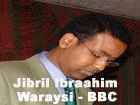|

|

Getting it Right this Time By Babafemi A. Badejo, PhD
Senior Political Adviser, UNPOS
21 July 2004
Honorable Ali Abdi Farah
Assistant Minister Mirugi Kariuki
Honorable Ambassadors here present
The UN Resident Coordinator for Djibouti
Respected Business-men and -women
Ladies and Gentlemen of the Fourth Estate
Distinguished Guests,
It is a great pleasure for me to be back in Djibouti after a long absence from a city that is like a second home. The opportunity to be here arose out of a clash in the programme of Ambassador Winston Tubman, the Representative of the UN Secretary-General for Somalia. He had to undertake an urgent diplomatic mission on Somalia that arose after he had concluded all arrangements to be here. He sends his felicitations through me to His Excellency, President Ismail Omar Guelleh for his untiring belief and effort on the need for the revitalization of the Somali State. President Guelleh’s zeal has seen the convening of the High-level Dialogue with Somali Business Community. Ambassador Tubman also sends his deep regards to the participants at this meeting and especially the Somali business-men and -women who left the task of making money to attend to the crucial task of seeing Somalia back on its feet.
Monsieur Le Ministre
The importance of the role of business in a peace process was recently emphasized at the July 14 informal consultations of the Security Council on Somalia. Many Ambassadors representing sovereign countries took note of the opening of a Coca-Cola bottling plant in Mogadishu. They were excited and welcomed this development. It was not because they thought that this gift of the United States to the world was crucial for the existence of the simple Somali nomad as he searched for pasture for his camels. They were happy because they saw this development as a signal that peace was returning to Somalia. One of them asserted that capital was a weakling and runs fast from insecure situations. They saw the return of Coke as an indication that peace was about to break and security was returning to Mogadishu and Somalia. Another Ambassador noted that a similar development took place as peace returned to Liberia. Such an appreciation of the role of business at the highest political level is an indication of the importance of business for the peace process in Somalia.
Monsieur Le Ministre
Permit me to note that many, in disparaging comments about the many efforts to bring peace to Somalia, postulate that the Mbagathi peace process will be no different from earlier examples. I personally felt this way until the 5th IGAD Ministerial Conference espoused a decision of all the Ministers concerned about peace in Somalia, to work on the basis of genuine uniformity of approach. Events on the ground have, so far, supported this decision of the Ministers. Their zeal has also seen four Ministerial meetings on Somalia between May and now. The ultimate meeting to launch the new Somali Parliament is expected in a little over a week from today.
It must be accepted that the world environment in the post 9/11 period is different. Circumstances that could allow opportunities for the flourishing of terrorism are of concern to the general international community. A state in coma like that of Somalia is of concern. Such concern led the Security Council to show a desire to implement the arms embargo on Somalia. After two reports from experts and a visit to the region by the Sanctions Committee on the Somali Arms Embargo, a Monitoring Group was established pursuant to resolution 1519 (2003) of 16 December 2003. With this Monitoring Group, it is expected that it will not be business as usual with respect to the importation of weapons into Somalia.
Winston Tubman, in collaboration with many international observers and especially the European Commission, the African Union, the League of Arab States, the United States and a number of European countries has been working strenuously with Kenya and IGAD in making sure we get it right this time.
The commitment of the United Nations and the belief that this should be the last peace meeting in a foreign land on Somalia was demonstrated by the visit of Kofi Annan, the UN Secretary-General to Mbagathi on July 8, 2004. The sense of his speech to delegates on that occasion was that we must get it right this time and bring succor to many Somalis who live under harrowing situations.
Monsieur Le Ministre
The Somali business community has an interest in peace in Somalia. Many would suggest that the Somali business community is used to the short-term gains that are associated with the comatose state of their country.
However, I would like to suggest otherwise. To start with, simple things like each unto himself or herself with respect to security is an expensive way for business to thrive. Waste of human lives represents destruction of consumers and in many instances, family members. Associated with this are higher costs that Somali business-men and -women must carry in operating in a situation in which the world does not have an accepted counterpart with respect to governmental backing to a Central Bank. As you know, such a clearing house is essential for commercial transactions with other countries when it comes to needs like Letters of Credit. The discrimination arising from the lack of an acceptable passport in much of the world is a social cost. I do not want to belabor the point that there are social costs to living in the Diaspora as a result of fear of security for immediate family members after goods in transit in Somalia have been heavily fortified by technicals.
Important, however, is the fact that Somalia has a lot of potential with respect to the construction and rehabilitation of developmental infrastructures all over a vast land. While I will admit that some make some gains from chaos, such gains are not equal to the lives of several clan and family members who are threatened by insecurity that results from stray bullets, kidnapping for ransom, etc.
Monsieur Le Ministre
Somali business-men and -women, in trying to protect their goods in transit have also maintained militias. The business community has, at times, engaged in fire-fights that shed the blood of militias and innocent people. No moral or religious precept sanctions the making of money this way. In effect, the Somali business community has a stake in peace for Somalia, even if for moral or religious reasons among other reasons.
A federal state as is being negotiated in Mbagathi cannot but follow the pressures at the international level to be business-friendly. This suggests that there is enough latitude for dialogue between those in business and those who will be in charge of the apparatus of state power. Such a dialogue should start from now. The presence of designated representatives of the business community could still make a lot of difference in the selection of those to represent Somalia during the five years of transition. I would like to humbly suggest that the most recent statement by the president of the Security Council (S/PRST/2004/24) applies to the Somali business community. In a paragraph, it was stated:
The Security Council reiterates that the Somali parties themselves bear the main responsibility of achieving a comprehensive ceasefire throughout Somalia. The Council calls on the Somali parties to fully implement the ceasefire, to ensure security, and to resolve their differences through peaceful means.
Monsieur Le Ministre
This does not mean that the Somalis will have to do it all alone. IGAD as a whole and the government of President Mwai Kibaki of Kenya remain steadfastly devoted to the goal of seeing Somalia back on its feet. The Secretary-General of the United Nations used the occasion of his visit to Mbagathi to re-assure Somalis of the commitment of the United Nations to assist. He also called on the international community to help further. But even before his call, a core group was working on behalf of the international community to put in place a fast track Rapid Assistance Programme for the first six to twelve months of a government out of Mbagathi. The second track will see a pledging conference following a needs assessment. Italy has just made an additional contribution of $2,239,200 to an earlier $536,150 to the UN Trust Fund for Peace-Building in Somalia. Other contributors to this fund were: Ireland, $34,668.65; and Norway, $836,533.39.
If Somalis get it right, including the support of the Somali business community, more can be expected from the international community in addressing the different aspects of putting Somalia back on its feet.
Monsieur Le Ministre
Let me once again use this opportunity to thank President Guelleh for conceiving this initiative and commend the support of UNDP Somalia.
I thank you, Monsieur Le Ministre, for your kind indulgence.
Designed and hosted By The Web Technology







